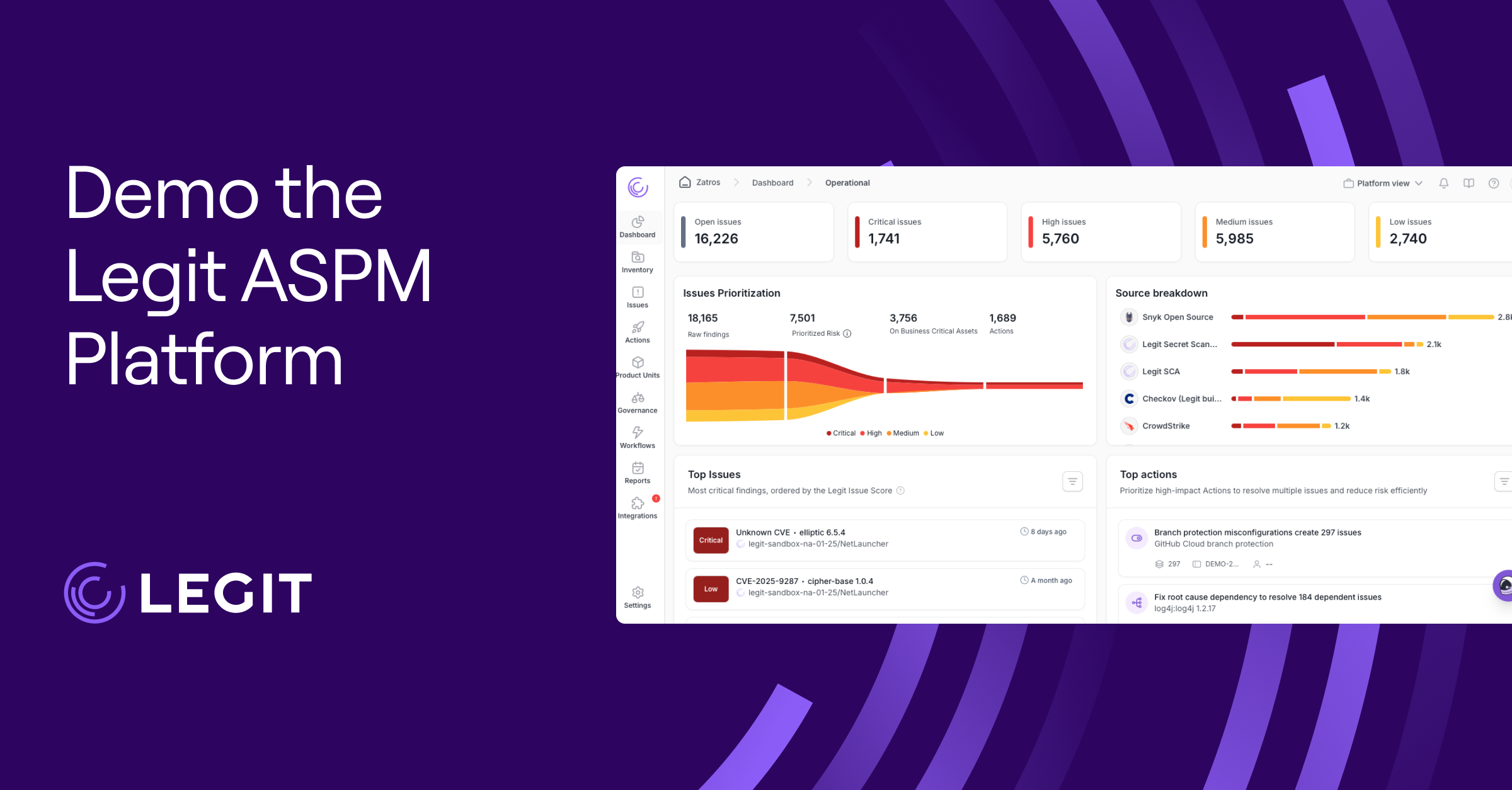Modern apps require hundreds of secrets to function (API keys, cloud credentials, etc.). However, poor management of these secrets can expose sensitive information publicly or to malicious actors.
Effective secrets management keeps sensitive information safe and avoids breaches. Here’s a guide to managing secrets, the most common challenges, and the best practices that keep systems secure.
What Is a Secret?
In cybersecurity, “secrets” refers to any confidential data that needs protection from unauthorized users. Secrets include the passwords and keys vital for authentication, encryption, and secure system communication. When compromised, they can lead to attacks or breaches, which is why it is so important to manage them properly.
Common types of secrets include:
- API keys: These codes confirm requests between applications.
- Passwords: Passwords are the most widely used method for authenticating both users and systems.
- Cloud credentials: These authentication keys provide access to cloud services like AWS, Azure, and Google Cloud.
- Encryption keys: Encryption protects data by making it unreadable to anyone without access.
- Tokens: These temporary credentials validate users or systems during a session.
- SSH keys: Secure shell (SSH) keys provide secure, encrypted access to remote servers.
What Is Secrets Management?
Secrets management is the process of storing, managing, and controlling access to sensitive information like passwords and encryption keys. The goal is to maintain secret security and minimize the risk of unauthorized access.
Secrets management has become even more critical as organizations shift to multi-cloud environments. In these complex environments, secrets spread across multiple services and systems, making them harder to track and secure.
Having a clear and organized system in place allows for more precise tracking. Plus, some security tools offer automated secrets management to reduce human error, enforce tighter security practices, and ensure compliance.
What Is a Secrets Management Service?
Secrets management services provide tools and systems to help organizations securely handle sensitive information. They protect codebases by controlling access to API keys, credentials, and passwords, reducing the risk of introducing security vulnerabilities during software development.
Here are a few examples of services that offer secrets manager tools:
- Azure Key Vault: Microsoft offers this centralized solution for managing encryption keys, authentication, and API credentials. It’s designed to scale easily as your application or organization grows.
- AWS Secrets Manager: This service allows teams to securely encrypt their codebase, manage access permissions, and rotate credentials regularly. It also provides auditing and monitoring tools to ensure applications are always secure.
- HashiCorp Vault: IBM’s HashiCorp Vault focuses on identity-based security. Managers can issue time-limited, authenticated credentials to developers on an as-needed basis, reducing unnecessary exposure.
- Kubernetes: This open-source automation and scanning tool enables teams to securely deploy and update secrets in a hybrid stack configuration that works both on-premises and in the cloud.
The Impact of Secrets Management
Secrets management is about more than just protecting passwords. It has a huge impact on a company’s operations and reputation. Many high-profile breaches have occurred due to improper management of secrets—usually when teams haven’t stored or hardcoded sensitive data with the right precautions.
In 2016, Uber suffered a major data breach that exposed the personal data of 57 million customers and drivers. The breach occurred because an attacker was able to access Uber’s private GitHub repository, where sensitive credentials—including AWS access keys—were hardcoded. Once the attackers had these credentials, they accessed Uber’s cloud infrastructure and stole the data. Uber's failure to properly secure these secrets led to a $148 million settlement and a significant hit to the company's reputation.
Exposed secrets could also lead to regulatory violations under the General Data Protection Regulation (GDPR), Health Insurance Portability and Accountability Act (HIPAA), or Payment Card Industry Data Security Standard (PCI DSS). For example, under GDPR, the exposure of personal data due to poor secrets management can result in hefty fines and legal repercussions.
Secrets Management Challenges
The complexity of modern software development makes it challenging to identify, track, and protect secrets. Here are some common roadblocks.
Secrets Sprawl
As your organization adopts more cloud services, containers, and microservices, it gets harder to manage everything. Secrets sprawl happens when secrets are scattered across different platforms and environments, making them difficult to track.
Without a centralized system, you risk duplicating secrets, leaving them in unmonitored locations, or forgetting them in older environments. This broadens the attack surface significantly. To control secrets sprawl, you need a system that offers complete visibility to rotate and manage secrets securely.
Hardcoded Secrets
When secrets are hardcoded into source code, anyone accessing the repository can see them. Teams may forget to protect, rotate, or remove secrets from the code, leaving them vulnerable and making it harder to adjust them down the line.
Instead of embedding secrets in code, use a centralized management system where you can update them without code changes. This way, secrets stay secure and the development process remains efficient.
Insufficient Awareness and Visibility
It’s difficult to secure what you can’t see. If you don’t have visibility into where and how you store secrets, you’re likely missing potential vulnerabilities. For effective secrets management, you need a clear understanding of where sensitive data exists across systems—and what measures are in place to protect it.
Manual Secrets Management
Relying on manual processes to manage secrets increases the chance of human error and slows development cycles. In fast-paced DevOps environments, for example, tracking secrets manually can create bottlenecks, exposing sensitive data longer than necessary. Automating secrets management minimizes these risks and consistently rotates and updates secrets without intervention.
Secrets Management Best Practices: 4 Tips
Here are a few tips for handling secrets effectively.
1. Centralize Secrets Management
Centralizing secrets means consolidating all processes into a single secrets management tool or vault. In this context, a vault represents a secure platform specifically designed for storing and managing secrets.
This approach enforces consistent security policies and streamlines access controls, reducing the chance of human error and avoiding storing secrets in insecure locations like configuration files or repositories.
2. Automate Secrets Rotation
Manually rotating secrets is inefficient and risky—not to mention time-consuming. Automating this process allows for more frequent and accurate updates, protecting data from unauthorized access without requiring manual intervention.
3. Implement Least Privilege Access
With the cybersecurity principle of least privilege, users and systems should only have the permissions they need to perform their roles. This approach minimizes the attack surface and limits damage if a secret is compromised.
4. Regularly Audit and Monitor Secrets
Regular audits and continuous monitoring catch unauthorized access and breaches early. A robust auditing process also lets you track who uses secrets and when, providing valuable insights into security gaps.
What Is a Secrets Management Tool?
A secrets manager helps you securely store, manage, and control access to sensitive information like passwords and cloud credentials. These systems provide a centralized solution for data protection, keeping vital information secure across the entire development lifecycle.
Secrets management is a critical first step, but robust secrets discovery and security are also important. That’s where Legit Security fits in.
Legit Security’s AI-powered secrets scanning tool offers a comprehensive approach, detecting and remediating secrets across the SDLC. Unlike standard solutions, Legit Security provides broader visibility into secrets, scanning everything from source code to developer tools, build logs, and documentation.
Key benefits of Legit Security’s scanner include:
- Visibility: Gain complete insight into secret storage across all developer assets.
- Prevention: Guardrails stop new secrets from entering your environment.
- Remediation: Actionable insights help you quickly resolve issues.
- Scalability: Legit Security can scan thousands of assets within minutes.
- AI-powered accuracy: Reduce false positives by up to 86%, enabling your team to focus on real threats.
Protect Your Secrets With Legit Security
Effective secrets management closes the door to your organization’s sensitive data and keeps bad actors from accessing it. But handling important information in complex environments isn’t easy without the right tools.
That’s where Legit Security’s AI-powered secrets scanner comes into play. It provides enterprise-grade performance, giving you the visibility, prevention, and remediation capabilities you need to secure secrets across the entire development lifecycle. Whether you’re protecting passwords, API keys, or sensitive data, Legit Security safeguards them from start to finish.
Ready to take secrets management to the next level? Request a demo.
Secrets Management FAQ
What Is the Primary Purpose of Secrets Management?
The primary purpose of secrets management is to prevent the accidental exposure of sensitive information, such as API keys, tokens, and encryption methods. Storing this data securely with a secrets manager minimizes the risk of introducing vulnerabilities into your software that attackers could exploit.
Conversely, centralizing secrets in a dedicated management tool also simplifies development. Instead of tracking credentials and keys across multiple locations, developers can access everything they need—from third-party integrations to data processing permissions—in one secure platform.
How Does Legit Security Help Reduce the Risk of Security Breaches?
Legit Security offers a suite of integrated tools that form a comprehensive security platform. From software development to supply chain protection, Legit Security helps you identify and address vulnerabilities before they escalate. Here are a few ways it helps reduce the risk of security breaches:
- Early security integration: By introducing security checks early in the software development process, Legit Security helps developers avoid deploying potential vulnerabilities from the get-go.
- Continuous monitoring: Legit Security continuously scans your codebase, cloud infrastructure, and CI/CD pipeline to flag risks and hardcoded secrets remediate vulnerabilities.
- Supply chain protection: Third-party dependencies often open doors for attackers, but Legit Security monitors these links to strengthen your supply chain security posture.
- Policy enforcement: Legit Security allows you to establish and enforce organizational policies and best practices automatically to simplify compliance efforts.
- DevSecOps alignment: Seamless integration with development and security workflows allows Legit Security to unify efforts across teams without slowing releases.
- Incident response: If a breach occurs, Legit Security pinpoints the underlying cause and guides you through remediation steps to prevent repeat incidents.
What Types of Critical Data Can Be Stored in a Secrets Management Service?
Secrets management tools centralize and secure sensitive information, protecting it from attackers while also making it easy for developers to access what they need. They prevent both breaches and risky deployments that could introduce vulnerabilities into your application.
A secrets manager can store many types of data, including:
- API keys: These maintain secure connections between your application and the databases, functions, and programs it relies on to manage customer data and access.
- Authentication credentials: Developers and end users need usernames and passwords to sign in to your application. A secrets manager keeps those credentials from falling into the wrong hands.
- Tokens: Temporary authentication tokens, like OAuth tokens, provide short-term access to third-party tools and APIs. A secrets manager ensures those tokens aren’t exposed or misused.
- SSH keys: Teams use SSH keys to access integrated development environments (IDEs) and other secure systems. Properly storing them in a secrets manager prevents unauthorized logins.
- Encryption keys: These keys are used to encrypt and decrypt data as it moves through your infrastructure. If compromised, attackers could view sensitive data while in transit.
- Audit logs: Logs from past scans record where vulnerabilities have appeared in your software and how you handled them. A secrets manager prevents attackers from using them to find weaknesses.
Download our new whitepaper.


